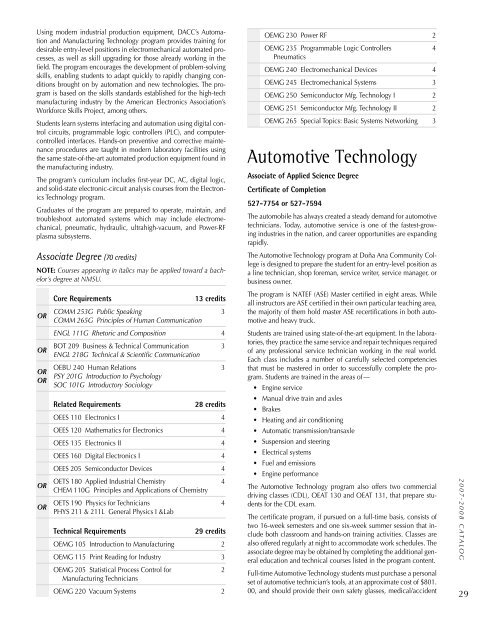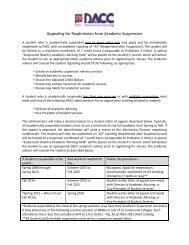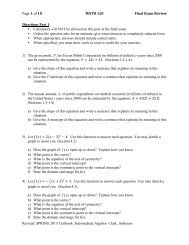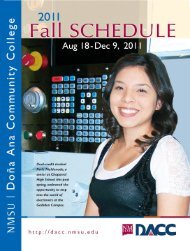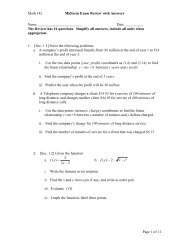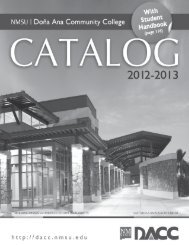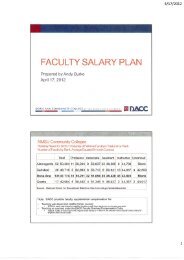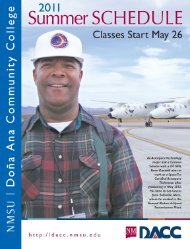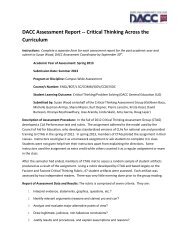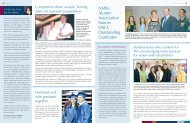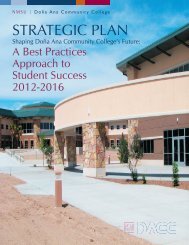online - Dona Ana Community College - New Mexico State University
online - Dona Ana Community College - New Mexico State University
online - Dona Ana Community College - New Mexico State University
Create successful ePaper yourself
Turn your PDF publications into a flip-book with our unique Google optimized e-Paper software.
Using modern industrial production equipment, DACC’s Automation<br />
and Manufacturing Technology program provides training for<br />
desirable entry-level positions in electromechanical automated processes,<br />
as well as skill upgrading for those already working in the<br />
field. The program encourages the development of problem-solving<br />
skills, enabling students to adapt quickly to rapidly changing conditions<br />
brought on by automation and new technologies. The program<br />
is based on the skills standards established for the high-tech<br />
manufacturing industry by the American Electronics Association’s<br />
Workforce Skills Project, among others.<br />
Students learn systems interfacing and automation using digital control<br />
circuits, programmable logic controllers (PLC), and computercontrolled<br />
interfaces. Hands-on preventive and corrective maintenance<br />
procedures are taught in modern laboratory facilities using<br />
the same state-of-the-art automated production equipment found in<br />
the manufacturing industry.<br />
The program’s curriculum includes first-year DC, AC, digital logic,<br />
and solid-state electronic-circuit analysis courses from the Electronics<br />
Technology program.<br />
Graduates of the program are prepared to operate, maintain, and<br />
troubleshoot automated systems which may include electromechanical,<br />
pneumatic, hydraulic, ultrahigh-vacuum, and Power-RF<br />
plasma subsystems.<br />
Associate Degree (70 credits)<br />
NOTE: Courses appearing in italics may be applied toward a bachelor’s<br />
degree at NMSU.<br />
OR<br />
OR<br />
OR<br />
OR<br />
OR<br />
OR<br />
Core Requirements<br />
13 credits<br />
COMM 253G Public Speaking 3<br />
COMM 265G Principles of Human Communication<br />
ENGL 111G Rhetoric and Composition 4<br />
BOT 209 Business & Technical Communication 3<br />
ENGL 218G Technical & Scientific Communication<br />
OEBU 240 Human Relations 3<br />
PSY 201G Introduction to Psychology<br />
SOC 101G Introductory Sociology<br />
Related Requirements<br />
28 credits<br />
OEES 110 Electronics I 4<br />
OEES 120 Mathematics for Electronics 4<br />
OEES 135 Electronics II 4<br />
OEES 160 Digital Electronics I 4<br />
OEES 205 Semiconductor Devices 4<br />
OETS 180 Applied Industrial Chemistry 4<br />
CHEM 110G Principles and Applications of Chemistry<br />
OETS 190 Physics for Technicians 4<br />
PHYS 211 & 211L General Physics I &Lab<br />
Technical Requirements<br />
29 credits<br />
OEMG 105 Introduction to Manufacturing 2<br />
OEMG 115 Print Reading for Industry 3<br />
OEMG 205 Statistical Process Control for 2<br />
Manufacturing Technicians<br />
OEMG 220 Vacuum Systems 2<br />
OEMG 230 Power RF 2<br />
OEMG 235 Programmable Logic Controllers 4<br />
Pneumatics<br />
OEMG 240 Electromechanical Devices 4<br />
OEMG 245 Electromechanical Systems 3<br />
OEMG 250 Semiconductor Mfg. Technology I 2<br />
OEMG 251 Semiconductor Mfg. Technology II 2<br />
OEMG 265 Special Topics: Basic Systems Networking 3<br />
Automotive Technology<br />
Associate of Applied Science Degree<br />
Certificate of Completion<br />
527-7754 or 527-7594<br />
The automobile has always created a steady demand for automotive<br />
technicians. Today, automotive service is one of the fastest-growing<br />
industries in the nation, and career opportunities are expanding<br />
rapidly.<br />
The Automotive Technology program at Doña <strong>Ana</strong> <strong>Community</strong> <strong>College</strong><br />
is designed to prepare the student for an entry-level position as<br />
a line technician, shop foreman, service writer, service manager, or<br />
business owner.<br />
The program is NATEF (ASE) Master certified in eight areas. While<br />
all instructors are ASE certified in their own particular teaching area,<br />
the majority of them hold master ASE recertifications in both automotive<br />
and heavy truck.<br />
Students are trained using state-of-the-art equipment. In the laboratories,<br />
they practice the same service and repair techniques required<br />
of any professional service technician working in the real world.<br />
Each class includes a number of carefully selected competencies<br />
that must be mastered in order to successfully complete the program.<br />
Students are trained in the areas of —<br />
• Engine service<br />
• Manual drive train and axles<br />
• Brakes<br />
• Heating and air conditioning<br />
• Automatic transmission/transaxle<br />
• Suspension and steering<br />
• Electrical systems<br />
• Fuel and emissions<br />
• Engine performance<br />
The Automotive Technology program also offers two commercial<br />
driving classes (CDL), OEAT 130 and OEAT 131, that prepare students<br />
for the CDL exam.<br />
The certificate program, if pursued on a full-time basis, consists of<br />
two 16-week semesters and one six-week summer session that include<br />
both classroom and hands-on training activities. Classes are<br />
also offered regularly at night to accommodate work schedules. The<br />
associate degree may be obtained by completing the additional general<br />
education and technical courses listed in the program content.<br />
Full-time Automotive Technology students must purchase a personal<br />
set of automotive technician’s tools, at an approximate cost of $801.<br />
00, and should provide their own safety glasses, medical/accident<br />
2 0 0 7 - 2 0 0 8 C A TA L O G<br />
29


